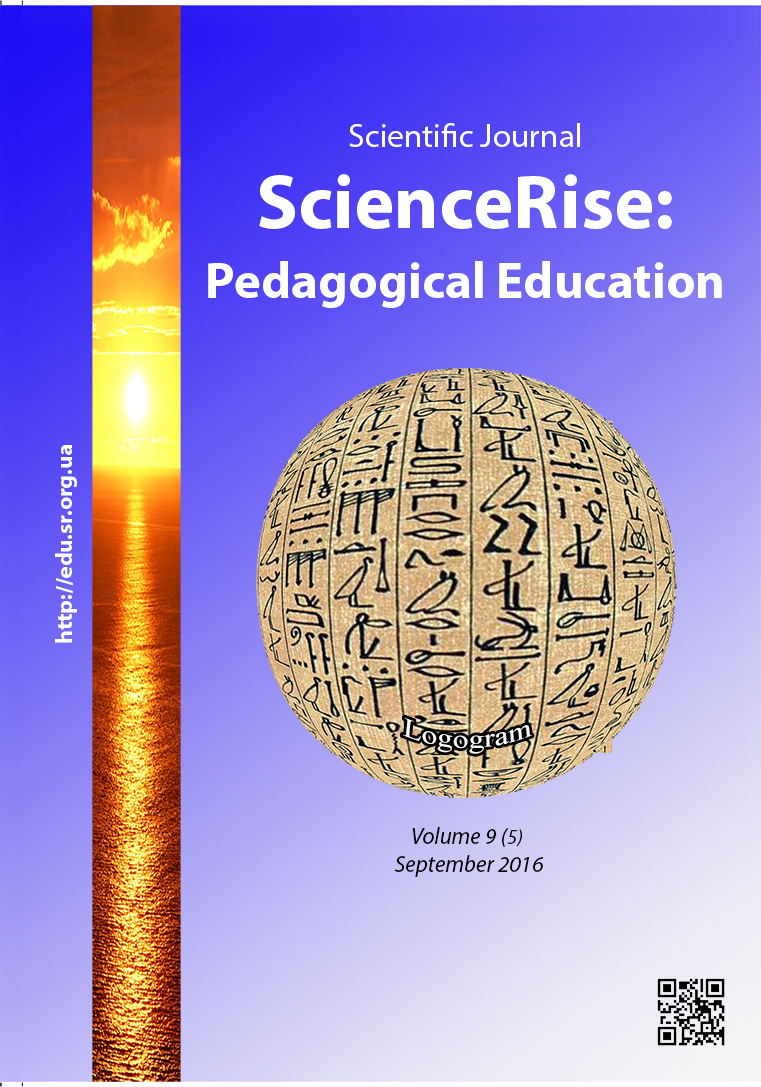The system of preparation of the future teacher of humanities for the professional activity in multisubject learning environment
DOI:
https://doi.org/10.15587/2519-4984.2016.78394Keywords:
multisubject learning environment, teacher-humanitarian, pedagogical system, pedagogical technology, multisubject interaction, motivationAbstract
The process of creation of pedagogical system of the training of future teacher-humanitarian for the professional activity in multisubject environment was grounded. The basic components of aforesaid system were characterized. The motivational component is determined as the one of node components of the system in the context of problem and specificity of the research: the analyzed fundamental native and foreign psychological and socio-pedagogical theories of motivation. The main components of the system were determined: conceptual, objective, stimulating-motivational, content, procedural-technological, correcting-effective. The effectiveness of the system must be attained under the following pedagogical conditions: formation of subject position of the future teacher-humanitarian; activation of reflexive processes at the learning interaction; the use of the methods of psychological-pedagogical influence on the effectiveness of learning interaction in PLE; the use of active and interactive methods in PLE; the use of the means of web-services Web 2.0
References
- Chaika, V. M.; Tereshhuk, G. V. (Ed.) (2006). Pidhotovka maibutnoho vchytelia do samorehuliatsii pedahohichnoi diialnostі [Training future teachers to self-teaching activities]. Ternopil': TNPU, 275.
- Pelekh, L. R. (2014). Teoriia i metodyka aksiolohichnoi osvity v Polshchi: porivnialnyi aspect [Theory and Methods axiological education in Poland: comparative aspect]. Rivne: PP DM, 402.
- Muranova, N. P. (2013). Fizyko-matematychna pidhotovka starshoklasnykiv do navchannia v tekhnichnomu universyteti [Physics and Mathematics high school students to study at the Technical University]. Kyiv: NAU, 464.
- Pyrohova, O. V. (2004). Modelyrovanye v obrazovanyy [Modeling in education]. Innovations in education, 5, 36–40.
- Meshko, H. M.; Kravec, V. P. (Ed.) (2012). Pidhotovka maibutnikh uchyteliv do zberezhennia i zmitsnennia profesiinoho zdorovia [Preparation of teachers to preserving and strengthening occupational health]. Ternopil': TNPU im. V. Gnatjuka, 468.
- Mykytiuk, S. O. (2012). Resursnyi pidkhid do profesiinoi pidhotovky maibutnoho vchytelia [Resource approach to training future teachers]. Kharkiv: Monrhraf, 342.
- Maslow, A. H. (1943). A Theory of Human Motivation. Psychological Review, 50 (4), 370–396. doi: 10.1037/h0054346
- Alderfer, C. P. (1969). An empirical test of a new theory of human needs. Organizational Behavior and Human Performance, 4 (2), 142–175. doi: 10.1016/0030-5073(69)90004-x
- McClelland, D. (1988). Human motivation. Boston: Cambridge Unversity Press, 676. doi: 10.1017/cbo9781139878289
- Herzberg, F. (1964). The Motivation-Hygiene Concept and Problems of Manpower. Personnel Administrator, 1 (27), 3–7.
- Vroom, V. H. (1964). Work and motivation. New York: John Wiley & Sons, Inc., 288.
- Locke, E. A. (1968). Toward a theory of task motivation and incentives. Organizational Behavior and Human Performance, 3 (2), 157–189. doi: 10.1016/0030-5073(68)90004-4
- Edberg, H. How negative motivation can help us overcome problems. Available at: http://www.positivityblog.com/index.php/2008/01/29/how-negative-motivation-can-help-us-overcome-problems/
- Klaryn, M. V. (1996). Lychnostnaia oryentatsyia v neprerуvnom obrazovanyy [Lychnostnaya orientation continuously in Education]. Pedahohyka, 2, 14–21.
- Radchuk, H. K. (2009). Aksiopsykholohiia vyshchoi shkoly. Ternopil, 415.
- Ostrowska, U.; Sliwerski, B. (Ed.) (2006). Aksio Logiczne Podstawy Wychowania. Vol. 1. Pedagogika: podstawynaukowychowaniu. Gdanks: GWP, 391–414.
- Rysmen, D. (1993). Nekotorye typu kharaktera y obshchestvo [Some Types nature and society]. Sotsyolohycheskye yssledovanyia, 3, 121–130.
- Rogers, C. (1983). Freedom to learn for the 80`s. Columbus – Toronto – London – Sydney: Ch. E. Merril Publ. Company, A Bell & Howell Company, 312.
- Yablonska, T. M. (2012). Metodolohiia realizatsii rolovoi perspektyvy yak stratehii yakisnoi pidhotovky maibutnikh uchyteliv-filolohiv [Methodology implementation strategy role-playing perspective as quality training of future teachers of philology]. Odesa: vydavets Bukaiev В. В., 228.
Downloads
Published
How to Cite
Issue
Section
License
Copyright (c) 2016 Євгенія Олександрівна Співаковська

This work is licensed under a Creative Commons Attribution 4.0 International License.
Our journal abides by the Creative Commons CC BY copyright rights and permissions for open access journals.
Authors, who are published in this journal, agree to the following conditions:
1. The authors reserve the right to authorship of the work and pass the first publication right of this work to the journal under the terms of a Creative Commons CC BY, which allows others to freely distribute the published research with the obligatory reference to the authors of the original work and the first publication of the work in this journal.
2. The authors have the right to conclude separate supplement agreements that relate to non-exclusive work distribution in the form in which it has been published by the journal (for example, to upload the work to the online storage of the journal or publish it as part of a monograph), provided that the reference to the first publication of the work in this journal is included.







